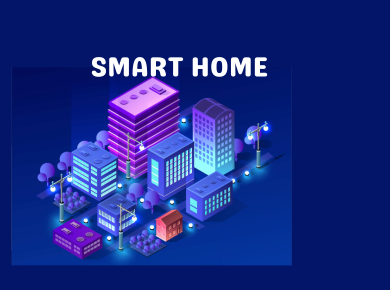In the past decade, the concept of a “smart home” has gone from science fiction to reality, dramatically changing the way we interact with our living spaces. The integration of technology into the home environment has enhanced convenience, safety, and energy efficiency, making daily life easier and more efficient. Here’s a look at how smart homes are revolutionizing our everyday routines.
1. Convenience at Your Fingertips
One of the most exciting aspects of smart homes is the level of convenience they offer. With the ability to control nearly every device in your home remotely, you can manage your home’s lighting, heating, security, and appliances with just a tap on your smartphone or voice command. Smart assistants like Amazon Alexa, Google Assistant, and Apple’s Siri have become the center of many smart homes, allowing you to control everything from music playlists to your thermostat without lifting a finger.
Imagine being able to adjust the temperature of your home before you arrive, so you walk into a perfectly warm house on a chilly winter evening. Or setting the lighting to match your mood with a simple voice command. Smart homes put total control in your hands, streamlining daily tasks and creating an environment tailored to your preferences.
2. Increased Energy Efficiency
As environmental concerns grow and energy costs rise, smart homes offer a powerful solution to reduce energy consumption. Smart thermostats like Nest and Ecobee learn your preferences and adjust heating and cooling automatically to optimize energy use. These systems not only help keep your home comfortable but also reduce unnecessary energy consumption by adjusting to your lifestyle. For example, the thermostat can lower the temperature when you’re away and adjust again when you return home.
Smart lighting systems also play a key role in energy efficiency. With motion sensors and the ability to schedule lights to turn on and off at specific times, these systems ensure that lights are never left on unnecessarily. The ability to control these systems from anywhere means that even if you forget to turn off a light or appliance, you can do so remotely, helping to cut down on wasted energy.
3. Enhanced Security Features
Home security is one of the most significant advantages of a smart home. Smart security cameras, doorbells, locks, and sensors provide an unprecedented level of control and peace of mind. With a smart doorbell like Ring or Nest Hello, homeowners can see who is at their front door in real-time, even if they’re miles away. These devices also allow two-way communication, so you can speak with visitors or potential delivery people, all from your smartphone.
Smart locks are another innovation that enhances home security. Gone are the days of worrying about lost keys or whether you locked the door when leaving. With a smart lock, you can lock and unlock your doors remotely, and some systems even allow you to create virtual keys for guests, contractors, or service workers. Additionally, motion sensors and security cameras can alert you immediately if something unusual occurs, keeping you informed and secure.
4. Improved Home Maintenance and Health
Smart home technology can also contribute to better health and home maintenance. Devices like smart air purifiers and humidifiers can help improve the air quality in your home, which is especially important for those with respiratory conditions. Some smart appliances even track how often you use them, providing reminders for maintenance tasks such as changing the filter in your refrigerator or cleaning your oven.
For individuals with health concerns, smart homes can offer extra support. Smart lighting systems can adjust according to circadian rhythms, promoting better sleep cycles, while smart mattresses can track sleep patterns, offering insights into sleep quality. Additionally, smart health devices like fitness trackers and smart scales can be integrated into your home, helping you track your overall well-being.
5. Entertainment Like Never Before
Smart homes are also revolutionizing the way we enjoy entertainment. Voice-controlled systems, integrated sound systems, and streaming services have completely transformed the media consumption experience. Imagine walking into a room and saying, “Play my workout playlist,” and instantly having music fill the space. Smart TVs, streaming devices, and smart speakers can be controlled by voice, giving you seamless access to entertainment from anywhere in your home.
Moreover, home automation systems can create the perfect ambiance for movie nights, dimming the lights, closing the curtains, and adjusting the temperature, all with a simple voice command or app. Smart homes make it easier to enjoy high-quality entertainment experiences without the need for complicated setups.
6. A Future of Endless Possibilities
The integration of artificial intelligence (AI) and machine learning into smart home devices is constantly evolving. As these technologies improve, smart homes will become even more intuitive, capable of learning and adapting to your preferences over time. For example, an AI-powered home could anticipate your needs, adjusting everything from lighting to entertainment based on patterns it has observed in your behavior.
Smart homes are also expected to play a major role in healthcare in the future, from remote health monitoring to elderly care, offering more personalized and proactive healthcare options. As 5G networks roll out, the speed and responsiveness of smart devices will increase, making them even more efficient and reliable.
Conclusion
The rise of smart homes is not just about convenience and luxury—it’s about improving the quality of life. From reducing energy consumption and enhancing security to offering personalized entertainment experiences and better home maintenance, the impact of smart home technology is profound. As the technology continues to evolve, the way we interact with our homes will only become more seamless and integrated, revolutionizing daily life in ways we’re only beginning to understand. Whether it’s improving your health, saving energy, or simply making life a little easier, smart homes are truly transforming the modern living experience.




